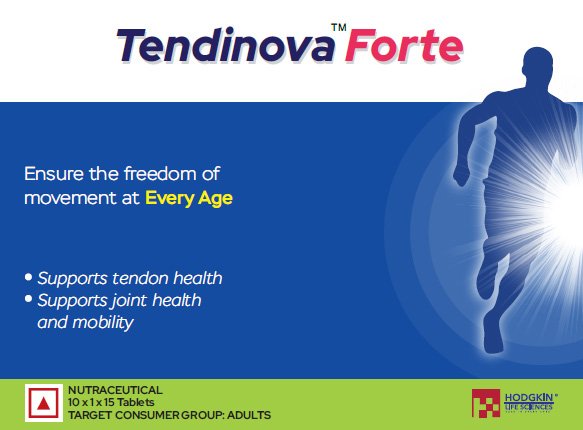- For Enquiry +91 9346607440
Brand Name: Tendinova® Forte
Composition: L- Arginine (As sustained release form) 500mg, Chondroitin Sulphate Sodium 200mg, Collagen Peptide Type I 40mg, Vitamin C 35mg, Sodium Hyaluronate 30mg Tablets
Advanced formula for tendon and ligament recovery, promoting faster repair and long-lasting relief.

USP: TENDINOVA FORTE™ provides 8-hour sustained-release L-Arginine for continuous nitric oxide support, enhancing blood flow to injured tendons and ligaments. Combined with key nutrients, it boosts collagen synthesis, reduces inflammation, and accelerates healing
- L-Arginine (SR): Provides 8-hour sustained nitric oxide release to enhance blood flow, oxygen delivery, and accelerate tendon and ligament healing
- Chondroitin Sulphate: Supports cartilage integrity and elasticity, helps reduce joint inflammation, and aids in the repair of connective tissues under stress or injury
- Collagen Peptide Type I: Stimulates new collagen formation, strengthening tendons and ligaments for natural regeneration
- Vitamin C: Essential for enzymatic collagen synthesis and acts as an antioxidant to reduce oxidative stress and enhance tissue recovery
- Sodium Hyaluronate: Improves joint lubrication and hydration, facilitates smooth tendon gliding, and helps minimize friction, stiffness, and adhesions during movement
Indications
- Supports healing in tendon injuries such as Tennis Elbow, Golfer’s Elbow, Achilles Tendonitis.
- Aids recovery from ligament injuries including ACL/MCL/LCL sprains, kneecap dislocation, Achilles rupture, AC joint injury, and rotator cuff tears.
- Provides joint support in conditions involving cartilage damage or age-related joint pain
References
- Heinecke, J., et al. (2019). Effects of L-arginine on tendon healing: a review of the literature. Journal of Sports Science & Medicine
- Volpi, N. (2009). Chondroitin sulfate: a key molecule in cartilage and bone metabolism.
- Schauss, A.G. (2012). Collagen hydrolysate for the treatment of osteoarthritis and other joint disorders.
- Myllylä, R., et al. (1984). Ascorbate is required for hydroxylation of proline and lysine in collagen synthesis.
- Ostwald, C., et al. (2008). Effects of hyaluronic acid on tendon gliding and adhesion formation.
